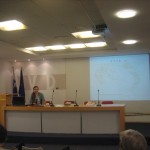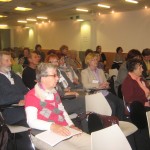In his introductory lecture dr. Josipovič from the Institute for Ethnic Studies in Ljubljana showed that the most common stereotypes concerning immigrants (“migrants have a very high birth rate”, “all migrations have economic reasons”; “migrants are uneducated”, “ they present a threat for the majority population because they are so numerous”) are based on a misinterpretation and manipulation of statistical data. In second lecture Martina Bofulin, a young researcher, talked about the Chinese migrations to Slovenia and their life among us.
The group discussions that followed expressed the following attitudes:
The attitudes to migrants vary depending on a number of factors:
- the country of origin (those coming from the West are accepted more readily than those from the former Yugoslav republics),
- the numbers of immigrants of a certain ethnicity (non-white people do not encounter problems since they are few; concentrations of non-Slovene people cause uneasiness),
- the immigrants’ acceptance of local norms and values (“if they are hard-working and honest”), their knowledge of the Slovene language (as a proof of their willingness to accept our norms),
- their level of education (the more educated immigrants have fewer problems dealing with new culture, language, etc.),
- their religion (nationality and religion are seen as a cohesive factor; little objection to the Serbian orthodox church and a strong Serbian community, fear of islam and opposition to building of a mosque),
- knowledge of the language and country of origin (hospitality once experienced is reciprocated),
- ethnic origin (children of mixed parentage tend to be more tolerant and view the nationality issue as less important),
- the Slovenian national character (introverted, suspicious, slow to open up and accept).
Immigrants (from the former Yugoslav republics) have brought us and taught us many positive things:
- multiculturalism was a great advantage,
- a sense of humour (circulation of jokes, anecdotes about typical characters, politicians),
- the ability of improvise,
- a wealth of literature (Andrić, Krleža, etc.) songs (Dalmatian, »starogradske«),
- new ways of preparing food, new dishes,
- recognition of our abilities (»… you Slovenes are a good people, hardworking…«),
- friendship and hospitality,
- economic benefits, etc.
The participants with the experience of living (studying or working) abroad found that, on the whole, Slovenes had few problems adapting to foreign environments, learn a foreign language, accept foreign customs and habits, since we do not want to be seen »sticking out«. A certain degree of integration is necessary. But what is integration?
- Integration is a cohesive force, replacing the role of religion.
- It is not assimilation or acculturation, which tend to impoverish everybody.
- It means respect of the culture and religion of the other. Religion is an integral part of a culture. Its expression should be allowed. Forced secularisation is dangerous as a threat to one’s identity. Should freedom of religious expression be allowed only on the individual level, and not in public life?
- Integration means changing of everybody through understanding of the other.
- It means not expecting the other to have the same hierarchy of values. It means to concentrate on communication rather than to insist on imposing your values.
- Meeting with the different is a source of wealth, not a threat.















